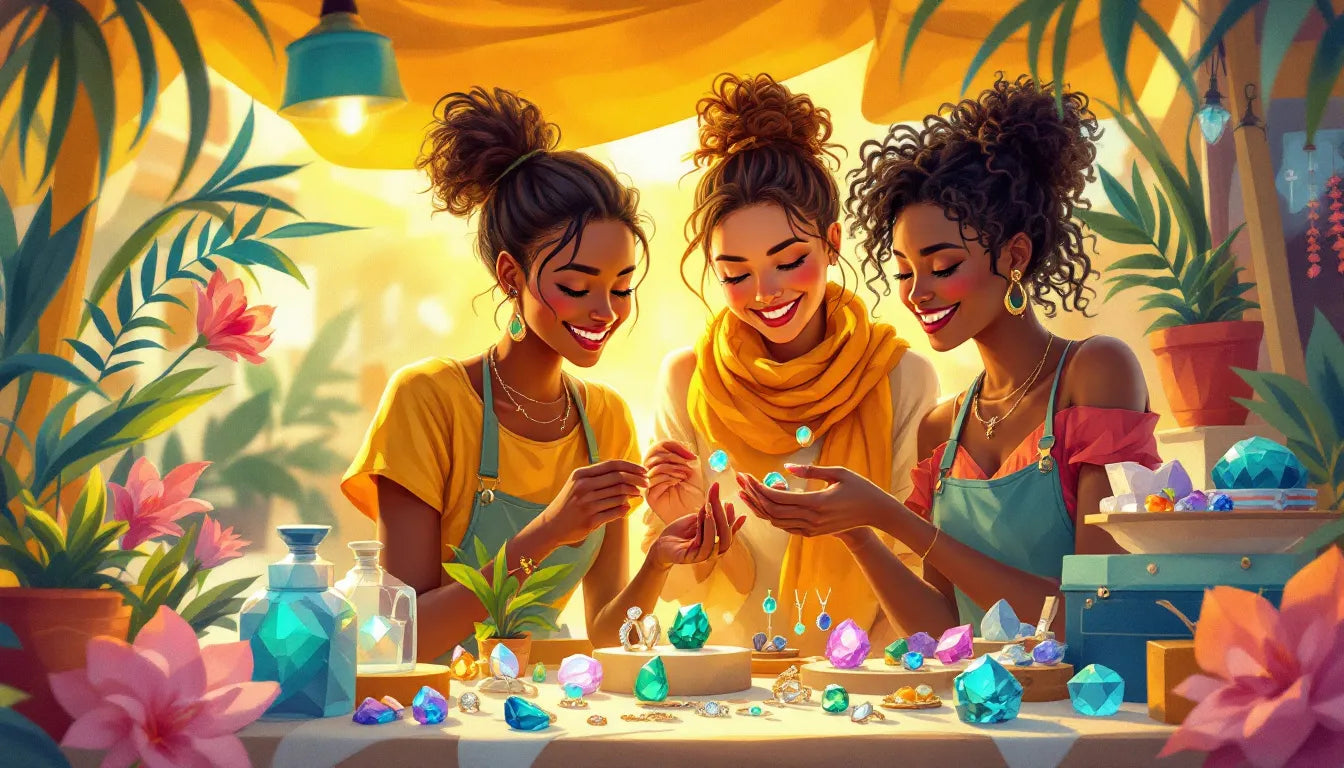Want to buy jewelry that looks good and feels good? Here's how to shop ethically:
- Check brand practices
- Look for certifications
- Choose recycled materials
- Try lab-grown gems
- Buy vintage pieces
- Support local jewelers
- Ask about sourcing
- Pick quality over quantity
Why it matters: Ethical jewelry supports fair labor, protects the environment, and avoids conflict materials.
Quick comparison of key certifications:
| Certification | Focus | Meaning |
|---|---|---|
| Fairtrade Gold | Gold | Fair wages, safe work |
| RJC | Supply chain | Ethics, labor, environment |
| KPCS | Diamonds | Conflict-free |
| Fairmined | Gold | Responsible small-scale mining |
Bottom line: Every purchase counts. By following these tips, you're not just getting pretty bling - you're supporting responsible practices in the jewelry industry.
Related video from YouTube
Check Brand Practices
Want to buy ethical jewelry? Here's how to dig into a company's methods:
1. Look for transparency
Ethical brands are open books. Take ARTICLE22 - they flat-out say their jewelry is "handcrafted in Laos using recycled materials from Vietnam War bombs, plane parts, and other aluminum scraps."
2. Check certifications
Look for stamps of approval from groups like the Responsible Jewellery Council (RJC) or Fairtrade. FUTURA Jewelry? They use "18kt Certified Fairmined Ecological gold."
3. Investigate the supply chain
Ask about the journey from mine to market. Brilliant Earth only uses traceable diamonds from conflict-free spots like Canada and Botswana.
4. Examine environmental practices
Does the brand use recycled stuff? Offset carbon? Maren Jewellery ONLY uses recycled 18K gold and silver.
5. Assess social impact
Some brands give back. Akola creates jobs for women in Uganda, using local, earth-friendly materials.
| Brand | Ethical Practice | Certification |
|---|---|---|
| ARTICLE22 | Recycled war materials | Not specified |
| FUTURA Jewelry | Fairmined Ecological gold | Fairmined |
| Brilliant Earth | Conflict-free diamonds | Not specified |
| Maren Jewellery | Recycled metals | RJC certified |
| Akola | Supports Ugandan artisans | Not specified |
Ethical brands LOVE questions. If they're vague or can't give details? That's a red flag.
"To decide if the jewelry is ethical, it's important to know where the jewelry materials come from, right down to the exact mine, where, and how the piece was made."
Remember: Good brands are proud to share their practices. So ask away!
2. Look for Jewelry Certifications
Certifications are your go-to when shopping for ethical jewelry. They're proof that a piece meets specific sustainability and ethical sourcing standards.
Key certifications to watch for:
1. Fairtrade Gold
Ensures fair wages and safe conditions for small-scale miners. Brands like Ingle & Rhode and Viltier use it.
2. Responsible Jewellery Council (RJC)
Covers the whole supply chain. Checks ethical practices, labor rights, and environmental care.
3. Kimberley Process Certification Scheme (KPCS)
Focuses on keeping conflict diamonds out of the market.
4. Fairmined
For gold from small-scale mining groups following responsible practices.
Here's a quick comparison:
| Certification | Focus | Meaning |
|---|---|---|
| Fairtrade Gold | Gold | Fair wages, safe work |
| RJC | Entire supply chain | Ethics, labor, environment |
| KPCS | Diamonds | Conflict-free |
| Fairmined | Gold | Responsible small-scale mining |
These aren't just fancy labels. They represent real efforts to improve the jewelry industry. The Kimberley Process, for example, covers over 99% of global rough diamond production and trade.
Don't hesitate to ask jewelers about their certifications. Trustworthy sellers will be happy to share. By choosing certified jewelry, you're supporting better industry practices.
3. Pick Recycled Materials
Recycled jewelry isn't just trendy - it's a game-changer for the planet. Here's the scoop:
Recycled metals come from old jewelry or industrial leftovers. This means less mining and more reusing. The best part? These metals keep their quality and value.
The impact is HUGE:
- Recycled gold: Up to 99.8% fewer greenhouse gases than new mining
- Recycled platinum: About 95% less emissions
- Recycled silver: Only 14% of the emissions from mining
Some brands are already on board. Zoë Chicco, for example, uses 100% recycled gold.
Want to shop smart? Here's how:
- Look for clear recycled material statements
- Ask brands about their sourcing
- Check for legit recycled certifications
4. Try Lab-Grown Gems
Lab-grown gems are shaking up the jewelry world. They're identical to natural gems, but with some key differences:
| Aspect | Lab-Grown | Natural |
|---|---|---|
| Growth Time | Weeks | Millions of years |
| Price | 20-40% cheaper | Pricier |
| Environmental Impact | Lower | Higher (mining) |
| Ethical Issues | Few | Potential conflicts |
| Availability | More | Limited |
Lab diamonds take just 6-10 weeks to grow, not millions of years. This makes them 20-40% cheaper than mined diamonds of the same quality.
Why choose lab-grown?
- No conflict diamond worries
- Less environmental damage
- More affordable
- Easier to customize
But keep in mind: lab-grown gems might not hold value as well as natural ones over time.
Shopping tips:
- Get certified (GIA or IGI)
- Compare prices
- Ask about the creation process
- Think about long-term value
"Lab-grown diamonds are verifiably more ethical than earth-mined diamonds." - Team GLDN
sbb-itb-d0b3b91
5. Buy Vintage Jewelry
Vintage jewelry isn't just stylish - it's a smart, ethical choice. Here's the scoop:
No new mining needed. These pieces already exist, so you're not adding to resource extraction.
Lower carbon footprint? You bet. These beauties were made long ago, so they're not contributing to today's pollution.
But here's the kicker: each vintage piece is unique. It's got its own story, its own character. You won't see yourself coming and going.
And let's talk quality. Many vintage pieces were crafted by skilled artisans. We're talking serious craftsmanship here.
Oh, and did I mention value? Often, you get more bang for your buck with vintage.
| Aspect | New Jewelry | Vintage Jewelry |
|---|---|---|
| Environmental Impact | Higher (new mining) | Lower (reusing materials) |
| Uniqueness | Mass-produced | One-of-a-kind pieces |
| Craftsmanship | Machine-made | Often handcrafted |
| Price | Can be high | Often better value |
| Story | None | Rich history |
Shopping for vintage? Keep these tips in mind:
- Check the condition
- Ask about its history
- Look for maker's marks
- Get it professionally cleaned
"Buying vintage jewelry is a wonderful way to protect the earth." - Nancy Plante, Author at Plante Jewelers
So, ready to rock some vintage bling?
6. Buy from Local Jewelers
Want to make your jewelry purchase count? Check out your local jewelers. Here's why:
Local jewelers often know their suppliers personally. This means you can ask where their materials come from. Plus, many offer custom pieces. You're not just buying jewelry; you're creating something unique that matches your values.
And don't forget: buying local keeps money in your community. It's a win-win.
Here's a quick comparison:
| Aspect | Local Jewelers | Large Chains |
|---|---|---|
| Sourcing transparency | High | Often limited |
| Customization options | Extensive | Limited |
| Community impact | Direct | Minimal |
| Personal service | Tailored | Standardized |
Pro tip: Ask your local jeweler about their sourcing. They're usually happy to share and might introduce you to new ethical options.
Buying local doesn't mean settling for less. Many local jewelers lead the way in ethical practices and cool designs.
So, next time you're eyeing some bling, why not check out your local jewelry store? You might be surprised.
7. Ask About Sourcing
Don't be shy - ask questions when shopping for ethical jewelry. Here's why:
Many gem dealers don't provide origin certificates. But that doesn't mean you can't get info. Eric Braunwart, owner of Columbia Gem House, says:
"If you want it, they will try and have it for you. It only doesn't happen when you don't even ask."
What to ask:
| Question | Why It Matters |
|---|---|
| Gem origin? | Spot potential conflict zones |
| Mining methods? | Check environmental and labor practices |
| Conflict-free diamonds? | Ensure ethical sourcing |
| Certifications? | Verify ethical claims |
Even if they don't have all the answers, their responses (or lack of) can be telling.
Pro tip: Write down the answers. It helps you compare sellers and make a smart choice.
Take Jaume Labro Jewelry. They use recycled gold, silver, and platinum from Japan. Plus, they only work with ethically sourced, conflict-free diamonds and gemstones. That's the kind of detail you want.
Fun fact: 36% of millennials won't budge on responsible sourcing for diamond wedding rings (2016 De Beers report). You're not alone in caring about this stuff.
8. Choose Quality Over Quantity
Want to shop for ethical jewelry? Go for quality, not quantity. Here's why it's smart:
- It's better for the planet
- It supports skilled artisans
- You get jewelry that lasts
When buying quality, ethical jewelry, look for:
| What to Check | Why It Matters |
|---|---|
| Materials | Recycled metals, ethical gems |
| Craftsmanship | Made by skilled artisans |
| Durability | Can handle daily wear |
| Design | Classic styles that last |
Before you buy, ask: "Will I love this years from now?" If yes, it's probably worth it.
Building an ethical jewelry collection takes time. Don't rush. It's better to save for one great piece than buy lots of so-so stuff.
Conclusion
Buying ethical jewelry isn't rocket science. Here's a quick rundown:
- Check brand practices
- Look for certifications
- Pick recycled materials
- Try lab-grown gems
- Buy vintage
- Support local jewelers
- Ask about sourcing
- Choose quality over quantity
Every purchase counts. By following these tips, you're not just getting pretty bling - you're backing fair trade and responsible sourcing.
Take AGMES, a New York City brand. They use recycled metals and work with local businesses to keep their carbon footprint low. Or Poppy Finch, which uses certified recycled gold and ethical gemstones.
"The Product Hunt launch exceeded our wildest expectations and kickstarted our growth in ways we hadn't anticipated." - Akshay Kothari, CPO of Notion
This quote isn't about jewelry, but it shows how consumer choices can make waves. Your decisions can help ethical jewelry brands grow and shake up the industry.
So next time you're eyeing some new jewelry, think about its origins. Ask questions. Make smart choices. You'll end up with pieces you love - and a clear conscience to boot.
FAQs
What's the most ethical way to buy jewelry?
Look for pieces from factories certified by fair labor groups like the Fair Trade Federation or World Fair Trade Organization. These ensure workers get fair pay and safe conditions. Another option? Go for jewelry made with Fairtrade Certified Gold. It supports small-scale miners and helps protect the environment.
How can you source gemstones ethically?
When sourcing ethical gemstones, ask these questions:
- Can you trace the gem back to its mine?
- What are the working conditions like?
- Is the supplier known for ethical practices?
Keep an eye out for gems certified by organizations like Fairmined. They ensure responsible mining practices.
How do you avoid buying a conflict diamond?
To steer clear of conflict diamonds:
- Choose lab-grown diamonds. They're chemically identical to natural ones but made in controlled settings.
- Ask your jeweler about diamond sourcing. Avoid diamonds from countries with known human rights issues.
- Consider brands with strict sourcing policies. For example, De Beers' Forevermark diamonds come with responsible sourcing guarantees.
"Consumers need to ask questions when they shop, and to resist the easy answer." - Ian Smillie, conflict diamond expert


Leave a comment